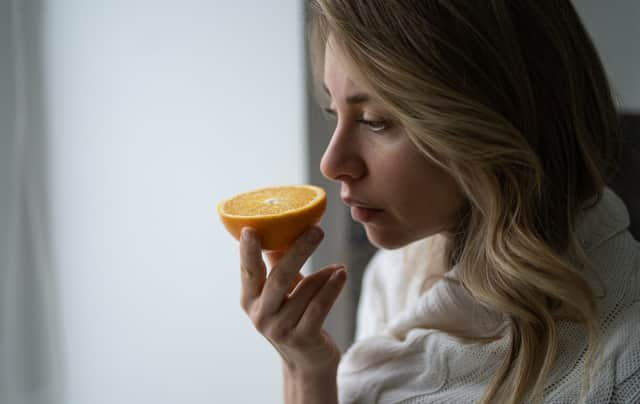Vitamin A nasal drops could help Covid sufferers who lost sense of smell


Vitamin A nasal drops could help to treat people who lost their sense of smell after being infected with Covid-19.
The University of East Anglia (UEA) is conducting a 12-week-trial to test the effects of the vitamin on those who experienced smell loss, or an altered sense of smell, due to coronavirus.
Advertisement
Hide AdAdvertisement
Hide AdWhat have researchers said?
The university has said that research from Germany has already shown the potential benefit of vitamin A in treating smell loss.
The UEA has said its team will explore how the treatment works to help repair tissues in the nose that have been damaged by viruses, and hopes the findings will help to improve the lives of millions “by returning their fifth sense”.
It comes after a study by an international group of smell experts, published in the journal International Forum of Allergy & Rhinology in April, advised against using steroids to treat smell loss and instead suggested “smell training”.
One of the researchers, Prof Carl Philpott from UEA’s Norwich Medical School, said there was “very little evidence” steroids will help with smell loss and they have “potential side effects including fluid retention, high blood pressure, and problems with mood swings and behaviour”.
Advertisement
Hide AdAdvertisement
Hide AdScientists have instead recommended that those who have experienced smell loss sniff at least four different odours, twice daily for several months.
Prof Philpott said the method “aims to help recovery based on neuroplasticity”, which is the “brain’s ability to reorganise itself to compensate for a change or injury”.
What is vitamin A good for?
Vitamin A, also known as retinol, helps the body with several important functions, including boosting its natural defence against infection.
The NHS says its main uses include:
- helping the body's natural defence against illness and infection (the immune system) work properly
- helping vision in dim light
- keeping the skin and the lining of some parts of the body, such as the nose, healthy
You should be able to get all the vitamin A your body requires from your diet, with foods rich in retinol including cheese, eggs, oily fish, fortified low-fat spreads, milk and yoghurt.
Advertisement
Hide AdAdvertisement
Hide AdThe daily recommended amount of vitamin A for adults aged 19 to 64 is 700 micrograms for men, and 600 micrograms for women.
How can I take part in the trial?
Those who are interested in taking part in the UEA’s ‘Apollo trial’ are advised to seek a referral from their GP to the Smell and Taste Clinic at the James Paget Hospital in Norfolk’s Great Yarmouth.
The study, which is being funded by the National Institute for Health Research, will start recruiting volunteers in December.
This article originally appeared on our sister site, NationalWorld.